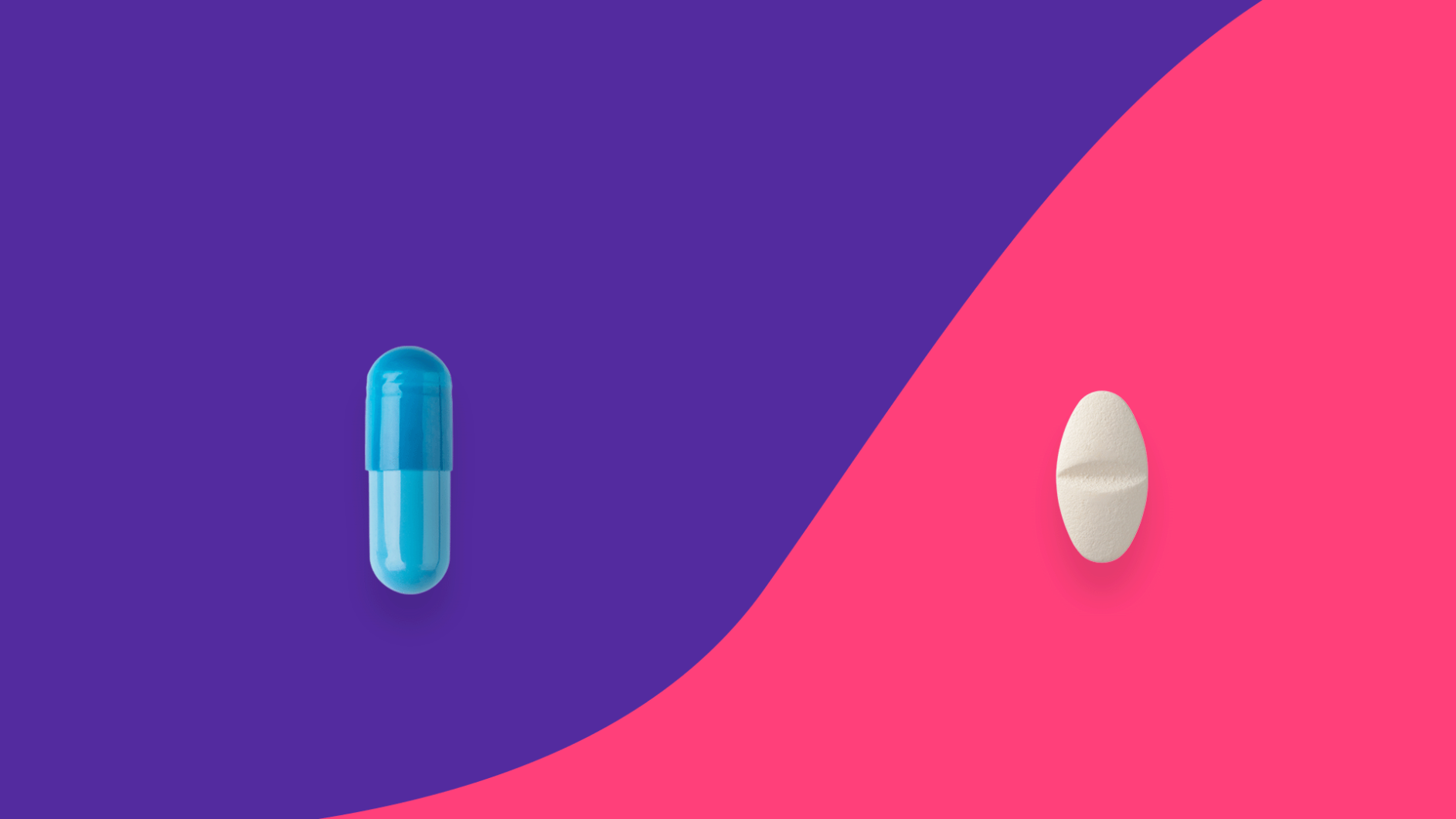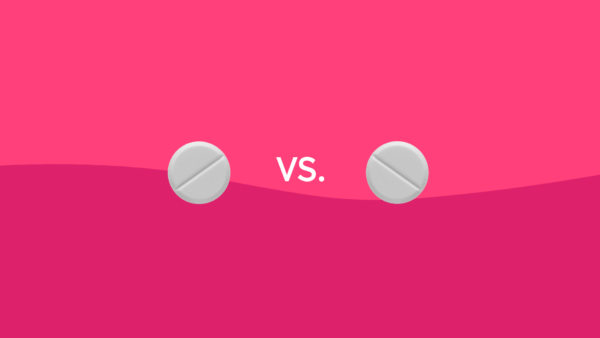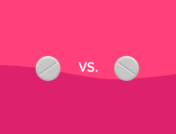What’s the difference? | Indications | Efficacy | Dosage & duration | Insurance & costs | Side effects | Drug interactions | Warnings | FAQ
Focalin (dexmethylphenidate) and Adderall (amphetamine/dextroamphetamine) are medications used to treat ADHD, or attention deficit hyperactivity disorder. The lifetime prevalence of ADHD in the United States is 11% and rising. As stimulants, Focalin and Adderall help improve focus and decrease impulsivity in people with ADHD. Although the exact way in which they work is unknown, Focalin and Adderall are believed to promote the effects of certain chemicals, such as norepinephrine and dopamine, in the brain. Low levels of norepinephrine and dopamine may contribute to symptoms of ADHD.
Focalin and Adderall are in the same drug class. However, they have some differences in formulation, uses, and side effects.
Focalin vs. Adderall: What’s the difference? |
||
|---|---|---|
| Focalin | Adderall | |
| Drug class | Stimulant | Stimulant |
| Brand/generic status | Brand name and generic available | Brand name and generic available |
| What is the generic name? | Dexmethylphenidate | Amphetamine/dextroamphetamine |
| Uses | ADHD, narcolepsy (off-label) | ADHD, narcolepsy |
| Who typically uses the medication? | Adults and children 6 years and older | Adults and children 3 years and older |
| Efficacy | Possibly more effective in children and adolescents than Adderall | Possibly more effective in adults than Focalin |
| What form(s) does the drug come in? | Oral immediate-release tablet, oral extended-release capsule | Oral immediate-release tablet, oral extended-release capsule |
| What is the standard dosage for ADHD? | Initially, 2.5 mg twice daily. Doses should be taken 4 hours apart with or without food. Doses can be increased each week by 2.5 to 5 mg up to a maximum total of 20 mg/day, or 10 mg twice daily. | Children 3 to 5 years old: 2.5 mg daily. Dosage may be increased by 2.5 mg in weekly intervals.
Adults and children 6 years and older: 5 mg once or twice daily. Dosage may be increased by 5 mg in weekly intervals. |
| How long is the typical treatment? | Long-term use should be evaluated periodically. | Long-term use should be evaluated periodically. |
What is Focalin?
Focalin is a prescription drug manufactured by Novartis Pharmaceuticals. Healthcare providers typically prescribe Focalin for the treatment of ADHD. It comes as a brand-name and generic form that contains the active ingredient dexmethylphenidate.
Focalin is part of a class of drugs called central nervous system stimulants (CNS stimulants), also known as stimulants. Immediate-release (IR) Focalin tablets are usually taken twice daily with effects that last up to four hours. Focalin is also available as an extended-release tablet (Focalin XR) that is taken once daily and lasts for up to 12 hours.
Dexmethylphenidate is an isomer, or close relative, of methylphenidate, the active ingredient in Ritalin, Concerta, Metadate, and Daytrana (methylphenidate patch). As a more active version of methylphenidate, dexmethylphenidate is supposed to have a longer-acting, more potent effect than methylphenidate with fewer side effects.
What is Adderall?
Adderall is a brand-name ADHD medication manufactured by Teva Pharmaceuticals. Adderall’s generic name is amphetamine/dextroamphetamine. It contains a combination of different amphetamine salts.
Like Focalin, Adderall works as a stimulant drug and is prescribed to improve focus and manage impulsivity in people with ADHD. Adderall comes in immediate-release and extended-release forms. Adderall IR pills are usually taken every four to six hours, whereas the extended-release capsule, Adderall XR, can be taken once daily for the treatment of ADHD.
Are Focalin and Adderall the same?
Both Focalin and Adderall are believed to treat ADHD in similar ways by blocking the reuptake of norepinephrine and dopamine in the brain. However, the main difference between the two is that Focalin contains dexmethylphenidate while Adderall contains a combination of amphetamine salts. Another primary difference is that Adderall is approved by the U.S. Food and Drug Administration to treat narcolepsy in addition to ADHD, while Focalin is only approved for ADHD. They also have differences in available strengths, side effects, duration, and age restrictions.
Conditions treated by Focalin and Adderall
Focalin and Adderall are prescription stimulant medications used to treat ADHD. Both medications treat ADHD symptoms such as impulsivity, restlessness, and trouble with organization, time management, and multitasking. Focalin is used to treat ADHD in adults and children 6 years and older, while Adderall is used to treat ADHD in adults and children 3 years and older.
Adderall is also FDA-approved to treat narcolepsy, a chronic condition involving excessive daytime sleepiness. Focalin is not approved for narcolepsy, although, as a stimulant, it may have an off-label use for this purpose.
Treatment with Focalin or Adderall is often prescribed along with non-medication therapy, such as cognitive behavioral therapy (CBT). About one-third of children receiving treatment for ADHD receive both medication and behavioral treatment. In addition, around 60% of children diagnosed with ADHD have at least one other mental, behavioral, or emotional condition, such as severe depression. For children with ADHD and other conditions, different medications may be recommended along with stimulants.
Is Focalin or Adderall more effective?
Both Focalin and Adderall are similar in effectiveness. They work similarly as stimulants to treat symptoms of ADHD.
One meta-analysis from The Lancet pooled data from 133 double-blind, randomized clinical trials. This review compared methylphenidate-containing drugs, including dexmethylphenidate, amphetamines, including lisdexamfetamine, and non-stimulants, such as guanfacine and clonidine, for the treatment of ADHD in children and adults. Results found that methylphenidate-containing drugs are more effective in children and adolescents, while amphetamines are more effective in adults. These results are based on using methylphenidate or amphetamines as a first-choice treatment for short-term ADHD treatment.
Another study compared the effectiveness of the extended-release forms of Focalin and Adderall in children and adolescents. Researchers found that Focalin XR and Adderall XR were both effective in reducing symptoms of ADHD. Improvements in symptoms were based on the dosage of the medication rather than the type of medication given; higher dosages were associated with improved symptoms.
Consult a doctor for professional medical advice for you or your child. One treatment may be preferred over the other depending on the person’s age, previously tried medications, and overall health condition.
Dosage and duration
Focalin and Adderall are available in short-acting, immediate-release tablets. Focalin is usually taken twice daily, with four hours in between each dose. The maximum Focalin dose is 20 mg per day or 10 mg twice daily.
Adderall IR tablets are usually taken two to three times per day. One dose is taken in the morning, followed by one or two doses with four to six hours between each dose. The maximum Adderall dose is 40 mg per day in adults and 30 mg per day in children.
Both drugs are available in extended-release capsules (Focalin XR, Adderall XR). Because of their long-acting effects, extended-release Focalin or Adderall is taken once daily. The maximum dose of Focalin XR and Adderall XR is 40 mg per day in adults and 30 mg per day in children.
RELATED: Adderall vs. Adderall XR
Both drugs can be taken with or without food.
Immediate-release Adderall generally lasts longer than Focalin. The effects of Focalin last for around four hours whereas the effects of Adderall last for around four to six hours after a dose is taken. The extended-release formulas last 12 hours.
RELATED: Adderall dosage | Adderall XR dosage
Insurance coverage and cost comparison
Many Medicare and insurance plans cover generic Focalin. With an average cash price of around $120 for a 30-day supply of 10 mg tablets, Focalin can be quite expensive without insurance. You may be able to use a Focalin SingleCare card to save more. For a 30-day supply of 10 mg tablets, a SingleCare discount can bring the cost down to less than $20, depending on which pharmacy you use.
RELATED: Get the SingleCare prescription discount card
Generic Adderall may be covered by some Medicare and insurance plans. Without insurance, brand-name Adderall can cost an average retail price of $327 for 30, 20 mg tablets. However, using an Adderall coupon may reduce the price to approximately $13 for 60, 20 mg tablets of generic Adderall.
Focalin vs. Adderall costs |
||
|---|---|---|
| Focalin | Adderall | |
| Typically covered by insurance? | Yes | Yes |
| Typically covered by Medicare Part D? | Yes | Yes |
| Cost without insurance | $120 for 60, 10 mg tablets of brand-name Focalin | $327 for 30, 20 mg tablets of brand-name Adderall |
| $498 for 30, 20 mg capsules of Focalin XR | $339 per 30, 30 mg capsules of Adderall XR | |
| SingleCare cost | $12 for 60, 10 mg tablets of generic Focalin | $13 for 60, 20 mg tablets of generic Adderall |
| $50 for 30, 10 mg capsules of generic Focalin XR | $168 per 30, 30 mg capsules of brand-name Adderall XR | |
| SingleCare coupons | Focalin coupons | Adderall coupons |
| Generic Focalin XR coupons | Adderall XR coupons |
Prescription drug prices often change. These are the most accurate medication prices at the time of publishing. Click the coupon buttons to see updated drug prices.
RELATED: How much does ADHD medication cost?
Side effects
Focalin and Adderall share many of the same common side effects. Serious side effects include hypersensitivity reactions or allergic reactions to drug ingredients. Seek medical attention immediately if you experience a severe rash or trouble breathing (anaphylaxis) after taking these medications.
Source: DailyMed (Focalin), DailyMed (Adderall)
Side effects of Focalin vs. Adderall |
||
|---|---|---|
| Focalin | Adderall | |
| Shared common side effects |
|
|
| Shared severe side effects |
|
|
| Drug-specific side effects |
|
|
Frequency is not based on data from a head-to-head trial. This may not be a complete list of adverse effects that can occur. Please refer to your doctor or healthcare provider to learn more.
Drug interactions
Focalin and Adderall have similar drug interactions. See the list below and consult a healthcare professional for other possible drug interactions.
Focalin vs. Adderall drug interactions |
|||
|---|---|---|---|
| Focalin | Adderall | Action needed | |
| Shared interactions among stimulants | Monoamine oxidase inhibitors (MAOIs) | Do not take stimulants within 14 days of stopping MAOI. May result in severe high blood pressure, stroke, and heart attack. | |
| Serotonergic drugs, such as antidepressants, fentanyl, lithium, and St. John’s wort | Do not combine. Can increase risk of serotonin syndrome, a potentially life-threatening condition. | ||
| Blood pressure medications | Dosage adjustments may be needed, as stimulants may counteract the effects of blood pressure medications | ||
| Drug-specific interactions | Certain anesthetics | Proton pump inhibitors (PPIs) | Consult a healthcare provider before undergoing surgery while taking Focalin, as combining halogenated anesthetics with Focalin may lead to blood pressure and heart rate changes. |
| PPIs may alter the absorption of Adderall. Consult a healthcare provider before taking PPIs with Adderall. | |||
Warnings of Focalin and Adderall
Controlled substances
Focalin and Adderall are controlled substances that have a high potential for substance abuse. Both drugs are classified as Schedule II drugs by the U.S. Drug Enforcement Administration (DEA). Taking these medications long-term may carry a risk of drug abuse, dependence, or addiction, especially if they are taken without a prescription. These medications should only be used under the guidance of a medical professional.
RELATED: Adderall misuse among college students
Cardiovascular events
Focalin and Adderall are CNS stimulants that may be linked to an increased risk of cardiovascular events, such as stroke and heart attacks. Their use should be monitored in people with a medical history of heart problems including heart disease, heart rhythm problems (arrhythmias), or other heart conditions. As stimulants can increase blood pressure and heart rate, a healthcare provider may recommend monitoring blood pressure while taking stimulants, especially for people with a history of high blood pressure.
RELATED: Causes of chest pain and how to treat it
Mental health problems
The use of stimulants may cause or worsen other mental health problems. Watch for signs of hostility, anxiety, aggression, paranoia, and depression while taking stimulants. Before taking Focalin or Adderall, tell your doctor if you have a history of depression or bipolar disorder.
Pregnancy and breastfeeding
Taking a prescription stimulant while pregnant may harm an unborn baby. Consult a healthcare provider before taking Focalin, Adderall, or another stimulant while pregnant or breastfeeding.
Frequently asked questions about Adderall vs. Focalin
Is Focalin or Adderall better?
Both Focalin and Adderall are effective treatment options for ADHD. Clinical studies suggest that Focalin is better for treating children and adolescents while Adderall is better for treating adults with ADHD. Both drugs are available in immediate-release and extended-release forms. Individuals should consult a healthcare provider for the best treatment option for their specific symptoms, condition, and health history.
Can you take Adderall while pregnant? What about Focalin?
There may be a risk of birth defects with the use of Focalin or Adderall while pregnant. Stimulants should only be used if the benefits outweigh the potential risks. Not enough information is known about the risk of adverse effects while taking stimulants during pregnancy. Consult a healthcare provider before taking Focalin or Adderall during pregnancy. Unfortunately, other stimulants may also be harmful to an unborn baby. Focalin and Adderall alternatives while pregnant include non-pharmacological options, such as behavioral therapy, meditation, and lifestyle changes, such as exercise.
RELATED: Learn more about taking Adderall while pregnant
Can I use Focalin or Adderall with alcohol?
It is not generally recommended to drink alcohol while taking Focalin or Adderall. Consuming alcohol while on a stimulant can increase the risk of negative side effects, especially those on the heart, such as increased blood pressure and heart rate. Combining alcohol and stimulants long-term can also increase the risk of abuse, dependence, and overdose.
Which is stronger: Adderall or Focalin?
Focalin and Adderall are comparable in effectiveness for treating ADHD. The potency of a stimulant depends on the dosage prescribed, other drugs you may be taking, and your overall condition. Adderall may be considered a stronger stimulant than Focalin, as it lasts slightly longer.
Does Adderall expire? What about Focalin?
Like all medications, Adderall expires. Once the Adderall expiration date is reached, the drug becomes less effective. Focalin also expires and becomes less effective in much the same way. That’s because the ingredients in the medication start to break down over time, especially if the medication is not kept in ideal storage conditions. Always read the storage conditions on the drug label before using.
Does Focalin keep you awake? Will Adderall keep me awake?
Focalin and Adderall are CNS stimulants. They are prescribed to help improve focus and alertness in people with ADHD. Because of their stimulant effects, Focalin and Adderall can also promote wakefulness. Therefore, insomnia or trouble sleeping are possible side effects of stimulants. Some studies suggest that amphetamine stimulants cause more insomnia than methylphenidate-based stimulants.
How can I switch from Adderall to Focalin or vice-versa?
The process for switching between Adderall and Focalin will depend on the original dosage of the medication, among other factors. You should only switch between ADHD medications with the help of a healthcare provider. Your healthcare provider may recommend starting on a lower dosage of the new medication and gradually increasing the dosage based on your treatment response. That way, they can monitor for any possible side effects while switching.





